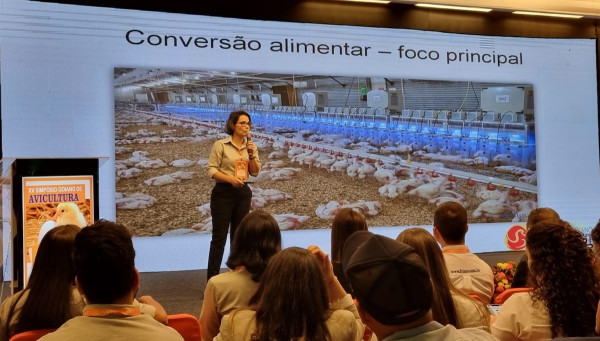
Aviagen Latin America Product Coordinator Jane Lara Grosso speaks enthusiastically to symposium attendees about continued genetic progress in broiler breeders
CAMPINAS, Brazil – The future is bright for poultry production in Brazil, with demand higher than ever before. Aviagen®, a poultry genetics company that produces Rosssup>® breeding stock, demonstrated its commitment to the sustainability of the industry in Brazil and beyond at the XV Goiano Poultry Symposium, which took place June 9-10, in Goiânia (GO), Brazil.
Considered one of the main regional poultry events, the symposium brought together close to 300 poultry professionals, who all benefited from knowledge shared by renowned experts in the poultry sector. Among them was Aviagen Latin America Product Coordinator Jane Lara Grosso, who offered her insight into the “Chicken of the Future.”
Grosso emphasized the genetic improvement of birds throughout the years in areas that benefit bird performance, health and welfare, as well as sustainability. These include including steady progress in feed conversion, meat yield, livability, reproductive fitness, leg health and more. She also highlighted the innovation behind genetic improvement programs, including new techniques and state-of-the-art equipment that serve to greatly improve selection accuracy.
Looking to the “chicken of the future,” Grosso said it is important for poultry breeders to work with their customers, keeping a close pulse check on consumer trends to be ready with the right bird for the right market and at the right time. “Because current selection will bring results in four to five years, it is important to accurately predict market trends, while also improving selection criteria for quality, food safety, animal welfare and sustainability,” she advised. “A holistic approach to breeding is important, with a selection process that balances market choice with sustainable poultry production.”
Grosso added that she is passionate about preserving our planet for future generations, and is excited about the genetic progress in this area, brought about mainly through improvement in feed conversion ratio (FCR), the driver of sustainability.
“Today’s broilers have a 50% smaller carbon footprint than birds in 1970, and looking ahead to the “chicken of the future,” birds in 2030 will have a 15% lower carbon footprint than the birds of today, yielding a 1% reduction in the annual carbon footprint of the global poultry industry,” concluded Grosso.